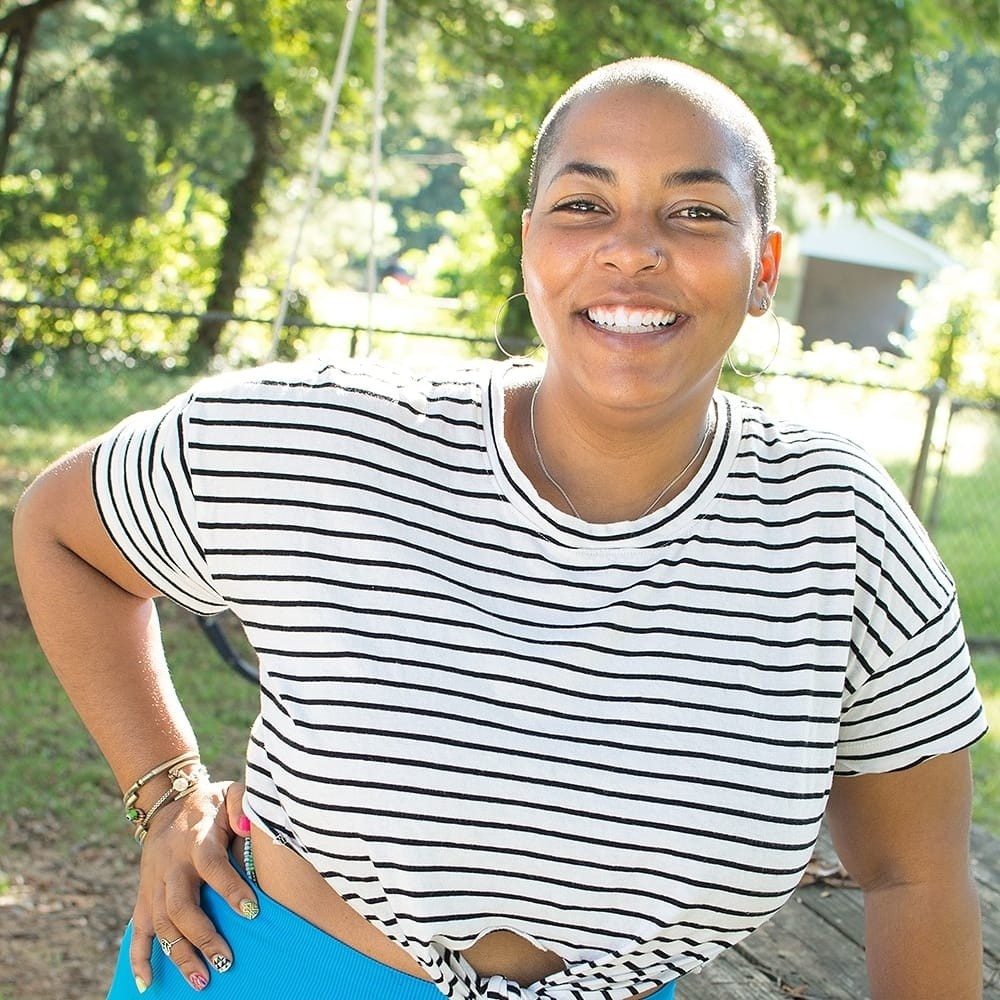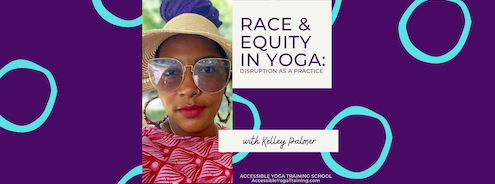Please register by clicking enroll button above and continuing on the Accessible Yoga Training website. Enrollment opens February 17 for the next cohort (get on the waitlist to be notified when registration opens!)
February 24 – March 5
This 12-HOUR LIVE ONLINE TRAINING / 4-part course meets 2 Wednesdays and 2 Fridays from 2-5pm PST (or 5-8pm EST) and includes breaks.
Schedule:
- Wednesday, February 24 – Lesson 1: Community Creation
- Friday, February 26 – Lesson 2: Systems of Oppression Within Yoga Communities
- Wednesday, March 3 – Lesson 3: Understanding Our Responsibility
- Friday, March 5 – Lesson 4: Sustainable Solutions
Race & Equity in Yoga: Disruption As a Practice is a self-study training where you’ll understand white supremacy and oppression, how you fit into these systems, and how you can use your yoga practice to disrupt, dismantle, and make change.
As a participant in this course you will:
Awaken to how racism and white supremacy show up in our yoga communities so that you can shift your perspective and work toward change
Gain a clear understanding about how you participate and uphold systems of oppression and specific steps to undo and prevent harm
Feel empowered to shift how you show up in wellness spaces as an activist or advocate
Gain tools for sitting with discomfort and having difficult conversations
Become more sure about calling others into action alongside you
Learn sustainable study tools around the history of racism, privilege, and power dynamics in (and out of) wellness spaces
Receive a rich resource list for further education and action
You’ll also get content from Race & Equity in Yoga course instructor Kelley Palmer:
-
Dharma talk outlining our responsibility right now when it comes to race equity
-
Guided meditation for sitting with discomfort: resource yourself for difficult conversations
-
Disruption as a practice: 5 opportunities for dismantling white supremacy
The movement for Black lives has become front-and-center news.
The murder of George Floyd during the global COVID-19 pandemic has catalyzed the largest civil rights movement in America’s history. The movement for Black lives has become front-and-center news. Widespread demonstrations, protests, and uprisings are causing our state and local governments to take a hard look at the role policing and prisons play in our society and the ways that resources are hoarded and unequally distributed among our citizens.
It is clear. A shift is necessary.
But let’s be real: this isn’t a new problem.
And since the dynamics of society are always replicated in our institutions, every industry from fashion to wellness is reckoning with its issues around race, equity, and social justice.
And since the dynamics of our institutions show up in our relationships, maybe you are finding yourself here, just one person, a yoga teacher, knowing you need to be part of this shift toward a more equitable world, but unsure of how to move forward.
About Kelley Palmer
 Hi, I’m Kelley Palmer (she/her). I’m an almost 40-year old Black woman who grew up in the American south. As such, I have been educated from a young age (both by knowledge and lived experience) about the history of white supremacy in this country.
Hi, I’m Kelley Palmer (she/her). I’m an almost 40-year old Black woman who grew up in the American south. As such, I have been educated from a young age (both by knowledge and lived experience) about the history of white supremacy in this country.
My first yoga teacher was a Black woman who taught me privately. I invited my mother to join me and she loved practicing yoga in this intimate setting. But when we went to a yoga studio she didn’t feel comfortable or welcome. I knew this feeling well.
I also had never stepped into a white-led wellness space and felt it was a space that was for me or invited me in. I began teaching yoga because I saw that it wasn’t just me and my mom. Black people didn’t feel comfortable or welcomed in wellness or yoga spaces, which were mostly set up and cultivated by white women who often didn’t see the very real barriers to belonging and liberation they had created.
The longer I teach, the more I see this: spaces that exclude or discourage Black and brown folks from practicing. And anyone with a critical eye can see that most yoga studios do not market yoga to Black people. But the truth of this practice is that yoga is for everyone.
Wellness is our birthright. This course and my work exists because my goal is liberation.
In working with white-identified and white-presenting people, it is clear to me that talking about racism (especially self-study when it comes to this topic) is not an easy conversation. Most white folks don’t have tools to move forward with courage when it comes to this topic. This means that folks who want to make change get stuck. Rather than take action to make their yoga spaces a better place for all, folks are just left with discomfort or indifference and nothing changes.


